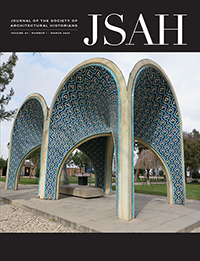-
Membership
Membership
Anyone with an interest in the history of the built environment is welcome to join the Society of Architectural Historians -
Conferences
Conferences
SAH Annual International Conferences bring members together for scholarly exchange and networking -
Publications
Publications
Through print and digital publications, SAH documents the history of the built environment and disseminates scholarshipLatest Issue:

-
Programs
Programs
SAH promotes meaningful engagement with the history of the built environment through its programsMember Programs
-
Jobs & Opportunities
Jobs & Opportunities
SAH provides resources, fellowships, and grants to help further your career and professional life -
Support
Support
We invite you to support the educational mission of SAH by making a gift, becoming a member, or volunteering -
About
About
SAH promotes the study, interpretation, and conservation of the built environment worldwide for the benefit of all
Society of Architectural Historians Launches Surveys for Study of Architectural History in Higher Education
Feb 21, 2020
by
SAH News
 The Society of Architectural Historians has launched three surveys to collect information from academics for its two-year study on the status of the field of architectural history in higher education in the United States, the SAH Data Project. The surveys are intended for chairs and administrators, faculty, and students and represent the most public phase of the project’s data collection to date. The aim of the SAH Data Project is to determine where and in what ways the field of architectural history is expanding, receding, or holding steady, and to consider the structural or cultural factors behind such trends.
The Society of Architectural Historians has launched three surveys to collect information from academics for its two-year study on the status of the field of architectural history in higher education in the United States, the SAH Data Project. The surveys are intended for chairs and administrators, faculty, and students and represent the most public phase of the project’s data collection to date. The aim of the SAH Data Project is to determine where and in what ways the field of architectural history is expanding, receding, or holding steady, and to consider the structural or cultural factors behind such trends.
The SAH Data Project team is using these surveys to gather some of the necessary quantitative data such as course enrollments over time, tenure-stream versus contingent faculty, faculty and student demographics. The surveys also collect crucial qualitative data about aspects of the field that may have long-lasting impacts, such as the effect of the 2008 economic downturn on architectural history programs and the extent to which students have demonstrated interest in social justice- or climate crisis-related architectural themes.
“The project team is eager to give as many people as possible a chance to share their experiences studying and/or teaching architectural history,” said Sarah M. Dreller, SAH postdoctoral researcher in the humanities. “The project defines ‘architectural history’ as the history of the built environment, which not only includes buildings but also interiors, landscapes, structures, cities, etc. Likewise, a student only must have completed one college architectural history class to be eligible to contribute. “
“In other words, the project would benefit from hearing from anyone regardless of their major or where they’re studying,” Dreller said, “including community college students, people in professional design programs, and so on. This emphasis on both breadth and depth is a key aspect of our data humanism approach and will ultimately help make the data analysis phase more genuinely reflective of the field as a whole.”
The three surveys for academics will remain open through May 15, 2020. SAH will invite architectural historians working outside the academy to share their perspectives and contribute to the project later this spring. This includes architectural historians employed by government agencies, nonprofit organizations, museums, design education organizations, preservation organizations and architectural publications, to name a few.
In addition to online surveying, the project methodology also encompasses a variety of other kinds of quantitative and qualitative data-gathering tasks such as conducting in-depth group conversations with project constituents and analyzing existing publication lists for thematic trends over time.
“The SAH Data Project is very important to our organization because the conclusions we draw from it will shape both our priorities and allocations of resources for years to come,” said Pauline Saliga, SAH executive director.”
The SAH Data Project is funded by a grant from The Andrew W. Mellon Foundation. More information and links to the surveys are available at sah.org/data-project.
